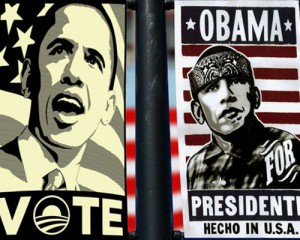 Political analysts agree: Latino voters will be pivotal in numerous 2012 battleground states – and perhaps determine the presidency in the process. Today, the Orlando Sentinel captures the dynamics at play in Florida, writing:
Political analysts agree: Latino voters will be pivotal in numerous 2012 battleground states – and perhaps determine the presidency in the process. Today, the Orlando Sentinel captures the dynamics at play in Florida, writing:
The presidential race could come down to this: To win in November, President Barack Obama or Mitt Romney needs the biggest swing state: Florida. For that, either man needs Florida’s critical swing area: the I-4 corridor. For that, he needs the corridor’s swing counties: Orange and Osceola. For that, he needs the emerging Hispanic base.
The thing about the two candidates, however, is that they have two fundamentally different assessments of how much immigration as an issue matters to Latino voters, both in Florida and across the nation.
Mitt Romney, of course, thinks everything is about the economy: his campaign told the Washington Post that they intend to shore up their poor standing among Latino voters “by focusing on economic issues in their messaging to the Latino community, believing that will overcome damage done during the primaries by Romney’s hard-line stance on immigration.” However, this is a fundamental misreading of the tea leaves: the issue of immigration is intensely personal to the majority of Latino voters, and it transcends simple policy debate.
While Latino voters, like all Americans, view fixing the economy as priority #1 for the next president, they also view immigration as a defining issue and are turned off by Romney’s anti-immigrant policies and rhetoric. As the Sentinel article notes about Puerto Rican voters who live around the I-4 corridor: “As Puerto Ricans, they are American citizens, so the immigration issue doesn’t directly affect them. As Hispanics, they still take it personally.” The piece then quotes a Florida voter of Puerto Rican descent named Julian Pérez, who says, “I know a lot of people who got deported. They were good people, you know. And I guess that’s what bothers me.” Such observations are far from unique. In fact, July 2011 polling from Latino Decisions found that 53% of Latino voters across the country said that they know someone who is undocumented, with 25% saying that they know someone who has faced deportation.
For the Romney campaign, and others hoping that a focus on the economy is enough to distract Latino voters from a damaging anti-immigrant stance, November 2011 polling from impreMedia and Latino Decisions should throw cold water on that theory. The poll asked Latino voters how they would feel about a candidate who had a negative stance on immigration, given that they already agreed with the candidate’s economic platform. “Let’s say one of the candidates had a plan to improve the economy that you supported,” the question posed, “and on the immigration issue the candidate said, quote: ‘illegal immigrants are a threat to America who have committed a crime, we can never support amnesty for illegals.’ Would that statement make you more likely to support the candidate, less likely to support the candidate, or would you not care what they said about immigration if you agreed with their plan for the economy?”
A full 59% of Latino voter respondents, including 55% in Florida, said that would make them “less likely to support” that candidate.

